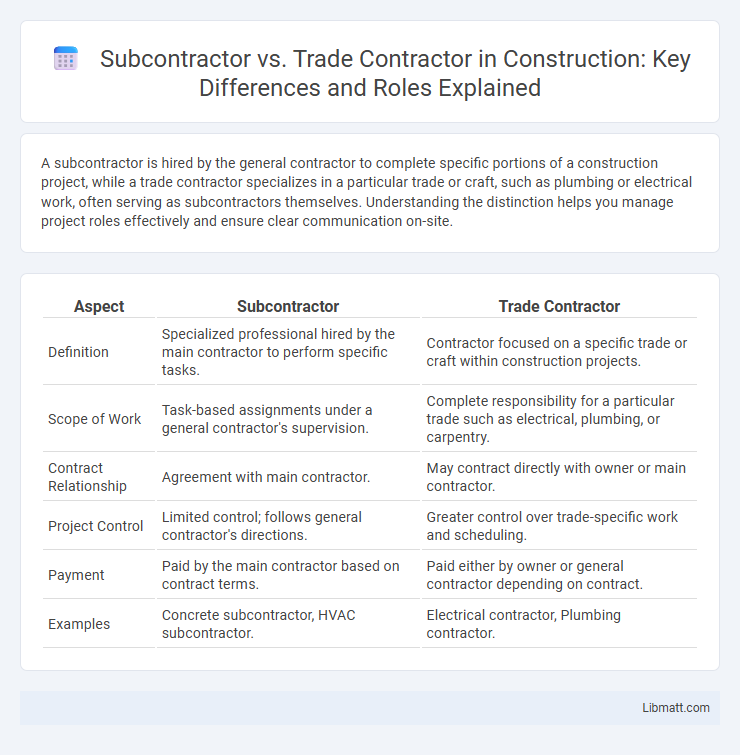A subcontractor is hired by the general contractor to complete specific portions of a construction project, while a trade contractor specializes in a particular trade or craft, such as plumbing or electrical work, often serving as subcontractors themselves. Understanding the distinction helps you manage project roles effectively and ensure clear communication on-site.
Table of Comparison
| Aspect | Subcontractor | Trade Contractor |
|---|---|---|
| Definition | Specialized professional hired by the main contractor to perform specific tasks. | Contractor focused on a specific trade or craft within construction projects. |
| Scope of Work | Task-based assignments under a general contractor's supervision. | Complete responsibility for a particular trade such as electrical, plumbing, or carpentry. |
| Contract Relationship | Agreement with main contractor. | May contract directly with owner or main contractor. |
| Project Control | Limited control; follows general contractor's directions. | Greater control over trade-specific work and scheduling. |
| Payment | Paid by the main contractor based on contract terms. | Paid either by owner or general contractor depending on contract. |
| Examples | Concrete subcontractor, HVAC subcontractor. | Electrical contractor, Plumbing contractor. |
Introduction: Understanding Subcontractors and Trade Contractors
Subcontractors are specialized professionals or companies hired by a general contractor to complete specific tasks within a larger construction project, ensuring expertise in areas such as plumbing, electrical work, or HVAC systems. Trade contractors, often used interchangeably with subcontractors, specifically refer to those who perform skilled trades directly related to construction activities, including carpentry, masonry, or steelwork. Distinguishing between general subcontractors and trade contractors helps project managers allocate responsibilities efficiently and maintain quality control across different phases of construction.
Definitions: What is a Subcontractor?
A subcontractor is a specialized contractor hired by the primary contractor to perform specific tasks or trades within a larger construction project, often possessing expertise in areas such as electrical, plumbing, or HVAC work. They operate under a contract with the main contractor rather than the project owner, bearing responsibility for completing their portion of the work on time and to specified standards. Subcontractors play a crucial role in efficiently managing complex projects by providing specialized skills and resources that the main contractor may not have in-house.
Definitions: What is a Trade Contractor?
A trade contractor specializes in a specific area of construction, such as electrical, plumbing, or HVAC, providing skilled labor and expertise for that particular trade. Unlike a general subcontractor, who manages multiple trades under a general contractor's direction, a trade contractor focuses on executing dedicated tasks within their specialty. Understanding the role of a trade contractor helps you accurately assign responsibilities and ensures expert handling of critical systems in your construction project.
Key Differences Between Subcontractor and Trade Contractor
Subcontractors are specialized professionals hired by general contractors to complete specific portions of a construction project, while trade contractors manage entire trades or disciplines, often overseeing multiple subcontractors within their scope. Subcontractors typically focus on a narrow set of tasks like electrical or plumbing work, whereas trade contractors coordinate broader trade activities, ensuring compliance with industry standards and project timelines. Understanding these roles helps you delegate responsibilities effectively, optimizing project management and execution.
Roles and Responsibilities in Construction Projects
Subcontractors specialize in specific tasks such as electrical, plumbing, or HVAC installations, providing expert labor and materials under the general contractor's supervision. Trade contractors often refer to these specialized subcontractors responsible for executing defined phases of the construction project according to technical specifications and schedules. Both entities collaborate closely to ensure compliance with safety standards, quality control, and timely completion within budget constraints.
Contractual Relationships and Project Hierarchy
Subcontractors enter agreements directly with general contractors, creating a tiered contractual relationship where the general contractor manages the overall project and coordinates multiple subcontractors. Trade contractors, often specialized in specific trades such as electrical or plumbing, may either operate as subcontractors or independent contractors, depending on the project's hierarchy and contract structure. Understanding these distinctions helps you navigate project responsibilities and ensure clear communication channels within complex construction hierarchies.
Advantages of Hiring Subcontractors
Hiring subcontractors offers specialized expertise that ensures high-quality workmanship in specific project areas, reducing the risk of errors and rework. Subcontractors bring established relationships with suppliers and familiarity with industry standards, which can lead to cost savings and timely project completion. This targeted approach enhances efficiency by allowing the primary contractor to focus on overall project management while subcontractors handle specialized tasks.
Benefits of Engaging Trade Contractors
Engaging trade contractors offers specialized expertise and efficiency for specific scopes of work, ensuring high-quality results within budget and timeline constraints. Trade contractors bring industry certifications and compliance knowledge, reducing risk and enhancing project safety. Your project benefits from their focused skills and established supply chains, leading to cost savings and streamlined communication.
Choosing Between Subcontractor and Trade Contractor
Choosing between a subcontractor and a trade contractor depends on the scope and specific needs of your construction project. Subcontractors manage particular portions of the work, such as electrical or plumbing tasks, while trade contractors typically oversee multiple trades or entire segments. Assess your project complexity, budget constraints, and control preferences to determine the best fit for efficient and quality outcomes.
Conclusion: Making the Right Choice for Your Project
Choosing between a subcontractor and a trade contractor hinges on the specific scope and complexity of your construction project. Subcontractors typically specialize in a narrower task within a larger project, while trade contractors manage broader work sectors, often overseeing multiple subcontractors. Evaluating your project needs, budget constraints, and desired level of oversight will help ensure you select the best fit to maintain quality and meet deadlines efficiently.
Subcontractor vs trade contractor Infographic

 libmatt.com
libmatt.com